Fortunately, electric car charging doesn’t need to be confusing. Free yourself from the tangled mess of charging cables with this guide, which we've created in partnership with the Energy Saving Trust.
How to charge your electric car
There are three basic ways to charge an electric car: at home, at work, or at a public charging point.
Charing your electric car at home

Want to start each day with a ‘full tank’? Charging each night at home will provide all the daily driving range the average driver will need.
You can charge using a regular domestic three-pin socket, but a dedicated home EV charger is a much faster option.
Dedicated EV home chargers typically deliver around 7kW of power. In contrast, most vehicle manufacturers limit the current drawn from a standard domestic 3 pin socket to 10A or less, which equates to a maximum of 2.3kW.
A 7kW home charger therefore delivers approximately three times as much power and is approximately three times as fast as using a domestic socket.
You can also make use of the charger's smart technology - for example, starting and stopping the charge remotely via a smartphone app. More importantly, if you have a low cost overnight electricity tariff it can be set to only charge when your electricity supply is at its cheapest.
We've got a full guide dedicated to charging an electric car at home, so head there for more information.
How much does it cost to install an electric car charger at home?
The typical cost of installing a home charge point is around £800-1200.
Under its Electric Vehicle Homecharge Scheme, the Office for Zero Emission Vehicles (OZEV) currently offers certain motorists a grant capped at a maximum of £350.
This includes those that live in a rental property or flat, or those who don't have off-street parking and need to install a cross-pavement charging solution.
The OZEV no longer offers a grant for homeowners with on-street parking, so it's worth considering if the savings will add up for you.
Install a home charging point
Going electric? Installing a home charging point makes owning an electric car so much easier and cheaper.
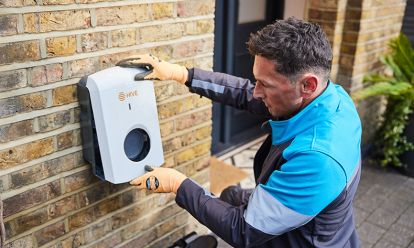

Workplace electric vehicle charging
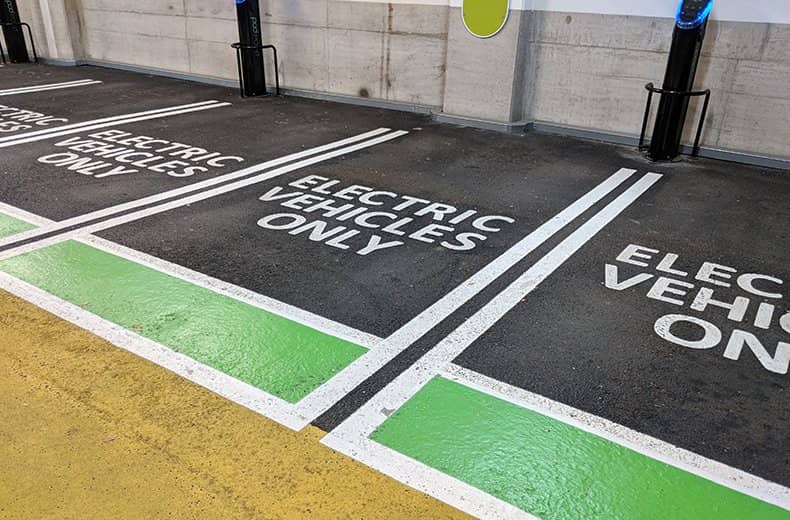
Workplace charging points make electric cars more viable for commuters who live a distance away from their location of work.
If your workplace doesn’t have an electric vehicle charge point installed, it could take advantage of the Government's Workplace Charging Scheme (WCS).
The WGS is a voucher-based scheme that provides a contribution towards the up-front costs of the purchase and installation of EV charge points. It’s worth up to £350 per socket – up to a maximum of 40 sockets.
Employers can apply for vouchers using the Workplace Charging Scheme application. Bear in mind, though, that the scheme is set to close 31 March 2025.
Even more generous grants exist - up to £2,500 per socket - for state funded schools and education institutions to install charge points.
Public electric vehicle charging
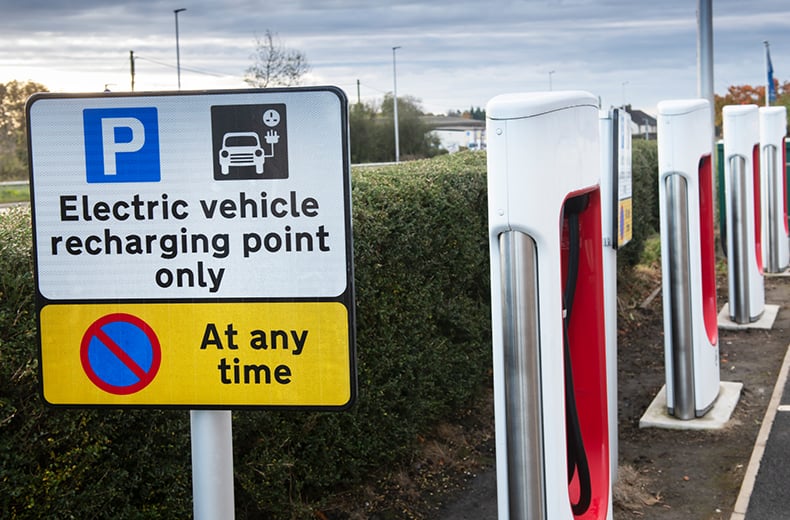
Public EV chargers can be found all over the place: at service stations, car parks, supermarkets, cinemas and simply at the side of the road.
Public chargers at service stations fulfil the role of petrol and diesel forecourts and are best suited for longer journeys. Such a rapid charging unit provides up to 80% of charge in as little as 15 minutes, depending on the car.
The network of public chargers continues to grow. Zap-Map reports a total of 70,000 charging points at 35,800 different locations nationwide at the time of writing (October 2024).
EV (electric vehicle) charging networks
There are a number of public EV charging networks in the UK, and thanks to government regulations the majority offer a similar charging experience.
The 2023 Public Charging Regulations state that all Charge Point Operators (CPOs) must display the total cost of the charging session. And, since November 2024, all new chargers outputting over 8kW of power (or 50kW for existing chargers) must offer a contactless payment solution - usually a card machine.
In theory, this means anyone can rock up to a charger and pay easily without having to download various smartphone apps or store numerous RFID cards.
There are now multiple CPOs operating in the UK, with the biggest including Gridserve with its ever-expanding Electric Highway, BP Pulse, Shell Recharge, Ionity, Instavolt and MFG. Many of these operators offer chargers that can output up to 350kW of power - enough for a substantial recharge in minutes.
In 2020, Gridserve opened the UK’s first service station forecourt purely for electric vehicles. In total there are now four of these across the country, while the company's motorway service station hubs have also expanded in recent years.
Tesla is, to date, the only carmaker to set up its own charging network for its cars. If you own one, simply turn up at a Supercharger station, plug in and wait for your EV to be recharged, with access via the car's app. Tesla is now allowing non-Tesla EVs to charge at a select number of its locations, too.
There are also regional charging networks, but many of them also offer access to customers of the larger EV networks.
If you are planning to rely on public EV charging, you can simply use contactless cards. However, some operators still offer a subscription service which gives cheaper charge rates for a flat monthly fee, which may save you money if you regularly use the same network.
There are many smartphone apps that allow you to check ahead, both for the location of chargers and the network running them. This can be important, as some network providers charge a hefty authorisation fee. It will be refunded, but can take some time.
How can I charge my car if I don’t have private parking?
If you don’t have private parking, an EV may still be a practical option for you – particularly if you have charge points at your place of work or a public charger near your home.
The RAC is the first breakdown assistance company in the UK to introduce a mobile charging unit for electric vehicle owners who have run out of charge and have become the number one provider of breakdown cover for electric vehicles. Find out more about RAC EV Boost.
- Electric cars – a definitive guide and tips for buyers
- Are electric cars really better for the environment?
- Electric car leasing explained – EV financing vs buying
How much does it cost to charge an electric car?
To fully charge an electric car at home can cost between £4 and £20 depending on your tariff and the size of your car's battery.
To charge an EV to 80% at a public rapid charger will be substantially more expensive - particularly if you're using the fastest rapid chargers. For EVs with the biggest batteries it could cost over £60 for a 10-80% charge.
A few years ago public charging was extremely cheap, but when energy prices soared so did the price of charging. Many CPOs are maintaining that high cost in order to fund the expansion of their network.
The price you'll pay varies depending on the company, the location, the charging speed and of course the size of your battery. Check out our electric car public charging cost guide, RAC Charge Watch.
As a general rule, charging an EV at home is far cheaper than fuelling a petrol or diesel car, but the cost is much closer when it comes to public charging.
The above estimates were calculated using Zap-Map’s home charging calculator and public charging calculator.
Read our full guide to electric car charging costs.
How long does it take to charge an electric car?
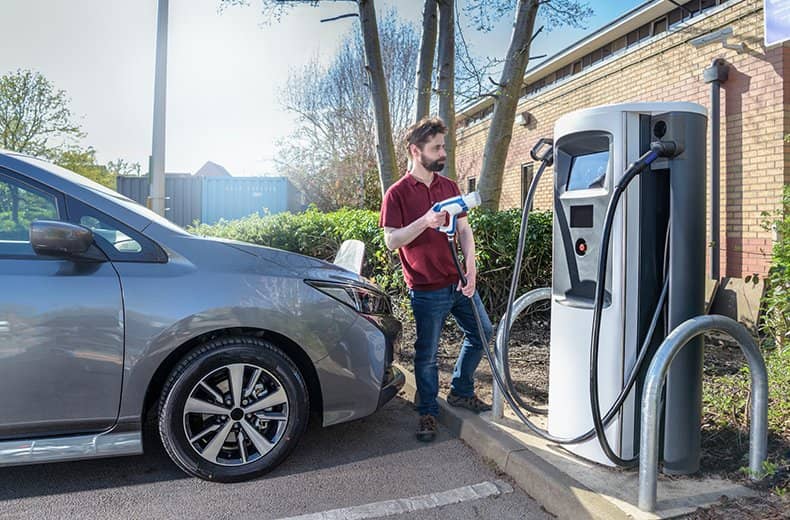
How long it takes to charge an EV depends on the size of the battery and the type of charger, which is defined by the power in kilowatts (kW).
This varies wildly - from several hours with a home charger to a matter of minutes with ultra-rapid public chargers.
Read our full electric car charging speeds guide to find out everything there is to know about how long it takes to charge an EV.
Electric car chargers, connectors and adaptors
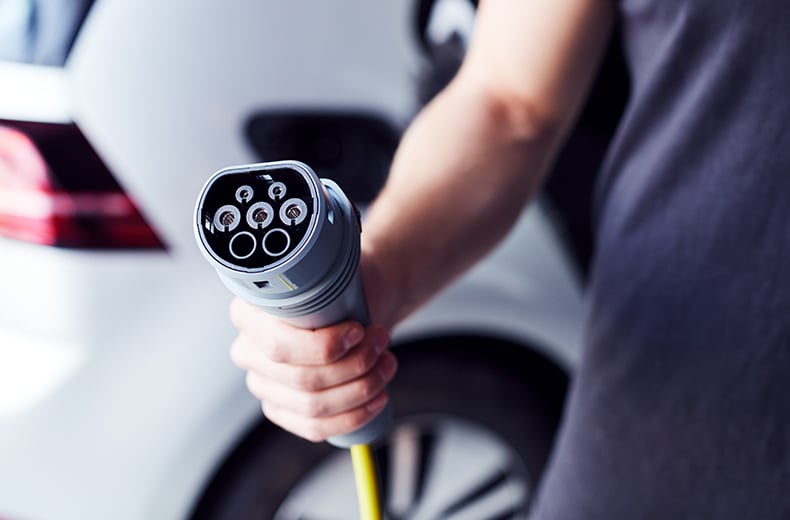
This is where things get slightly more complicated because there isn't yet a universal connector for electric vehicles and their different chargers.
Each charger type (slow, fast and rapid) has its own set of connectors for low or high power, and for AC or DC charging.
While that seems confusing, you'll find that the vast majority of modern electric cars use Type 2 slow/fast charging connectors and CCS connectors for rapid charging.
Here is a list of every different type of connector within each category.
Slow charge connectors:
- 3-pin 3kW AC
- Type 1 3-6kW AC
- Type 2 3-6kW AC
- Commando 3-6kW AC
Fast charge connectors:
- Type 2 7-22kW AC
- Type 1 7kW AC
- Commando 7-22kW AC
Rapid charge connectors:
- CHAdeMo 50kW DC
- CCS 50-350kW DC
- Type 2 43kW AC
- Tesla Type 2 120kW DC
The last thing you want is to get to a charging station when your battery is low, only to find it's not compatible with your car's charging input.
Always check your car's handbook and the charging network provider’s website for more specific information.
Are all EVs compatible with all chargers?
The vast majority of EVs and chargers in the UK are compatible. But for non-rapid charging you usually have to supply your own cable, which may come with your vehicle.
For non-rapid charging, EVs available in the UK will almost always have a Type 2 inlet socket. Some older EVs use a Type 1 socket, but this will need to be connected to an adapter to use Type 2 charging connections.
Luckily, your EV should be supplied with a cable that has the plug it requires, and at the infrastructure (charger) end, the cables are all compatible.
Rapid chargers use what are known as tethered cables – i.e. they are permanently connected to, and cannot be removed from, the charging unit.
In the UK most rapid chargers have two cables providing the two most popular rapid charge connectors (CHAdeMO and CCS), so you simply select and use the one that fits your EV. CCS is rapidly becoming the default charger type for new electric cars.
AC rapid charging was supported by a few older EVs, such as the Renault Zoe, but this has effectively been replaced by much faster DC rapid charging. Rapid chargers may have this option available on a third tethered cable, though.
Tesla uses its own network of 50,000+ rapid chargers known as Tesla Superchargers. Some of these locations now enable non-Tesla EVs to charge on the network. Some Tesla ‘destination chargers’, found in hotel car parks for example, can be used by other EVs too.
How do I know which chargers my EV can use?
If you have an EV you will know – from your dealer, lease company or handbook – what type of charging port it has.
The easiest way to find suitable public charge points is to use an app like Zap-Map, which shows the charge points on an interactive map.
Zap-map can be filtered by connector type, EV type or charging speed. It also tells you if there are any reported problems with a charger.

Breakdown cover that’s cheaper than AA – from £5.49 for Roadside!*
Complete peace of mind for less
• Cheaper than AA Price Guarantee^
• We get to most breakdowns in 60 mins or less
• Our patrols fix 4/5 breakdowns on the spot

Electric car range
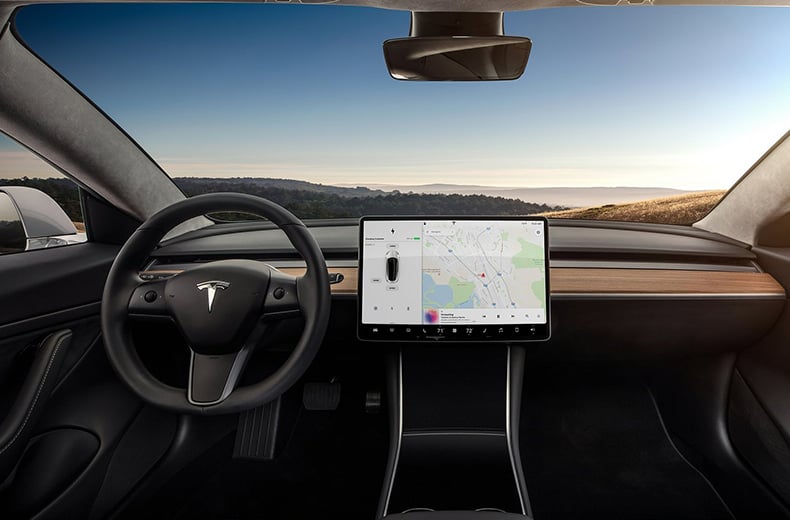
Most commonly, EV range is between 150 and 350 miles for a new or nearly-new model, depending on the size and type of car. Older EVs typically have a lower range.
As battery technology develops, this number is continually improving. The Tesla Model S Long Range, for example, boasts an impressive 405-mile range, and many new EVs are rated at over 300 miles.
As the UK’s charging infrastructure catches up with demand, this makes EV range very usable and practical.
The RAC has a mobile charging unit for electric vehicle owners who have run out of charge. Find out more about RAC EV Boost.
Read our dedicated guide to electric car range.
Electric car battery life
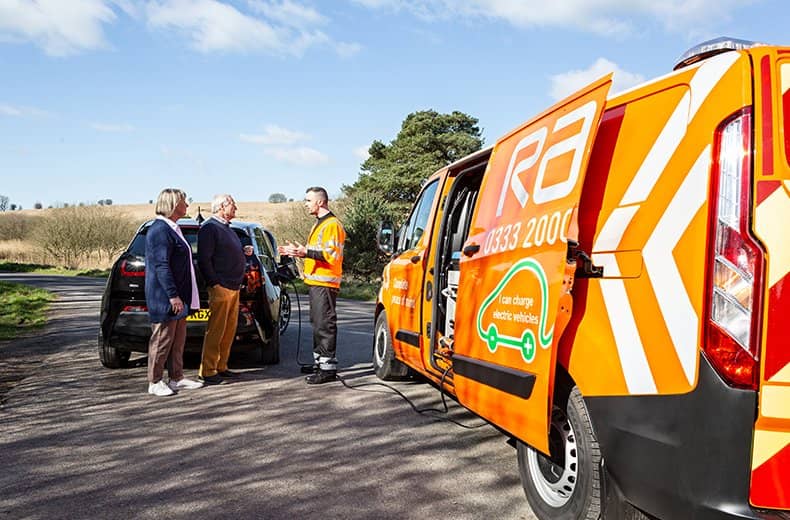
All batteries lose some performance over time and with use, but with EVs the losses tend to be fairly small and incremental.
The more dramatic battery failures that many of us have experienced with devices such as phones or laptops, where battery performance drops quickly with a device that’s a few years old, are almost unheard of with EVs.
One of the main reasons for this is that EVs have sophisticated battery management systems. These protect the batteries from overcharging, overheating and from charging too rapidly, all of which can cause damage.
This is why rapid chargers begin to ‘taper’ (reduce the power they deliver) once batteries are more than 80% full.
Today, many EVs are offered with long battery warranties. For example, Nissan offers an eight-year or 100,000-mile warranty. Under these terms, batteries are replaced or repaired if they lose more than 25% of their original capacity.
How to find electric car charging points
Zap-Map has a useful app that shows you the location of charging points across the UK.
Most electric cars also have sat nav that recognises these locations and can direct you to those within range. Some even offer a route planner, which for a long journey plans all of your charging stops and works out exactly how long you'll need to be at each charger to reach your destination.
Can electric cars charge themselves?
All electric cars have the ability to ‘self-charge’ their batteries a small amount when braking. This 'regenerative braking' feature converts kinetic energy into electricity and flows it back into the vehicle's battery to add valuable miles of range.
Some vehicle manufacturers have also begun calling non-plug-in hybrid vehicles ‘self-charging’ hybrids because they recharge their batteries via the same regenerative braking method, or via a generator powered by their internal combustion engine.
This term has the potential to confuse, since all hybrids and all EVs have the ability to ‘self-charge’ their batteries a small amount when braking.
Read our guide for more about hybrid cars.
The idea of a fully self-charging electric car is an attractive one for obvious reasons, but sadly no such cars currently exist on the market.
- How will electric cars impact the environment and our lives?
- Electric car insurance – is it cheaper?
- What is a hybrid car and should I buy one?
Can I charge in the rain?
Yes, rain does not affect electric vehicle charging. EV hardware is designed to be used safely in wet weather.
While EV charging is definitely more complicated than sticking a fuel nozzle in your car, we hope this guide has cleared up any confusion you might have about these vehicles.
What is the OLEV grant?
The Office for Low Emission Vehicles (OLEV) is a Government agency that aims to support the market for ultra-low emission vehicles (ULEV).
The OLEV Grant' refers to £350 funding for citizens looking to install a home charger. It used to apply to everyone, but in 2023 the terms were changed.
You're only now eligible for an OLEV grant if you live in rental accomodation or a flat, or you only have access to on-street parking and need a kerb-side solution.
Who qualifies for OLEV grant?
Vehicles that qualify for an OLEV grant include all EVs and plug-in hybrid vehicles with CO2 emissions of less than 50g/km.
Is the OLEV grant ending?
The fully accessible OLEV grant expired at the end of March 2023.
It's now only available for certain individuals (such as those who live in rented accomodation) or businesses looking to install chargers.
Install a home charging point
Going electric? Installing a home charging point makes owning an electric car so much easier and cheaper.


The RAC is leading the way when it comes to supporting drivers in the switch to electric vehicles.
An ever-increasing number of our patrol vans have built-in emergency mobile charging systems capable of giving an out-of-charge electric car enough power to be driven a short distance home, or to a working charge point. Our All-Wheels-Up recovery system also allows our patrols to safely rescue electric cars with no need for a flatbed.
Find out more about the RAC’s electric car breakdown cover and EV insurance options today.
Home EV charging cables are also available to purchase from the RAC Shop.
Are you sold on EVs? Or are you planning on holding on to your petrol car as long as possible? Leave us a comment below.
Return to the RAC Drive Electric cars hub
Read our guides on choosing, charging and running an electric car.

Breakdown cover that’s cheaper than AA – from £5.49 for Roadside!*
Complete peace of mind for less
• Cheaper than AA Price Guarantee^
• We get to most breakdowns in 60 mins or less
• Our patrols fix 4/5 breakdowns on the spot











